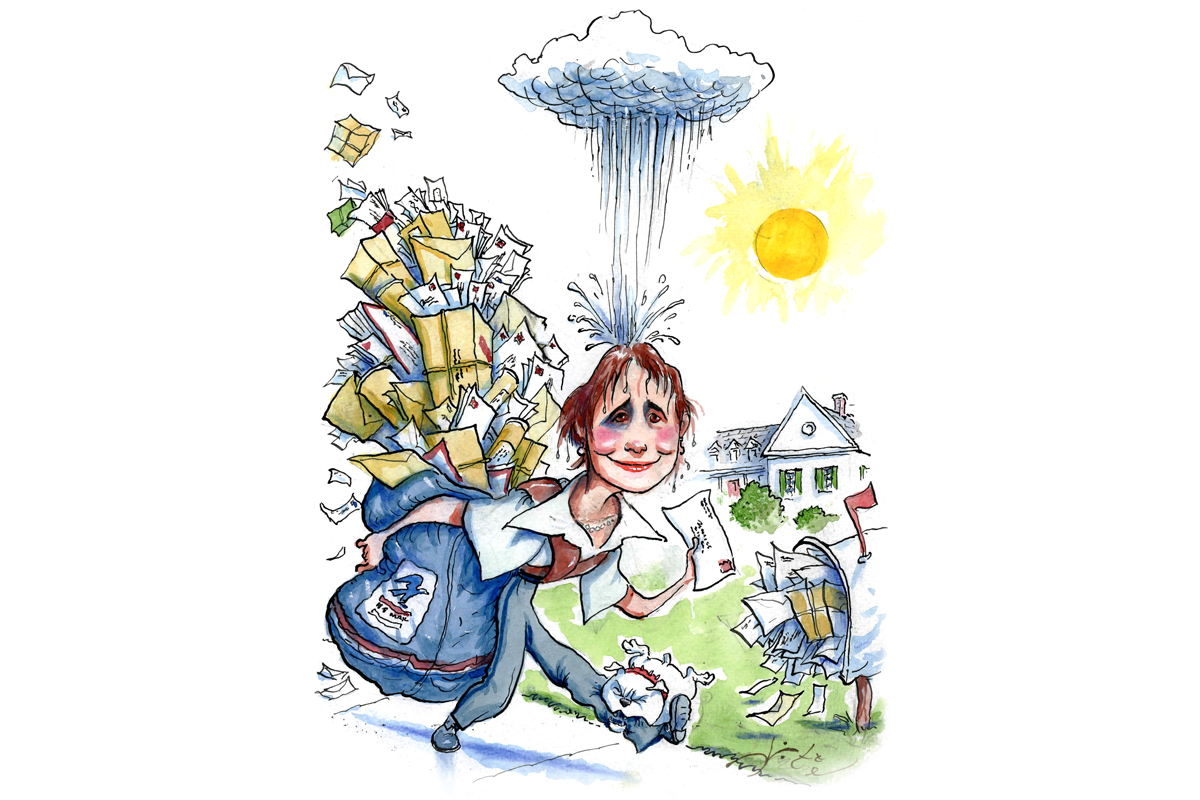Dear Postmaster:
I am a relatively successful literary fiction writer. My first novel was published in 2014 by Doubleday to wide acclaim, and I have had essays and reviews published in the New York Times and many other publications. However, even a relatively successful literary fiction writer does not necessarily make a consistent or substantial income, so I am looking for a more traditional job with regular hours and a regular paycheck.
I love the Postal Service and am interested in a permanent position. I need and enjoy physical work. I am quick, organized, efficient, and tough. I am not afraid of dogs, lots of walking, inclement weather, or rules, all of which I imagine might be involved in carrying the mail.
Thank you for considering my application.
Regards,
Merritt Tierce
The above is the cover letter I submitted with my application to the United States Postal Service in December 2015. I’d quit my full-time job as the executive director of a nonprofit right before my first book was published because I wanted to be able to go on a book tour and because I imagined that I was transitioning from life as someone who wanted to be a writer to life as someone who was a writer.
But a year later I felt I had failed at whatever “writing full time” means; my husband was beginning a campaign for district judge, and, with three teenagers, we didn’t have enough money for me to keep failing. So I began carrying the mail. I didn’t do it because of Faulkner or Bukowski or so I could write an essay about it. I just needed a job, and I didn’t want to sit down or talk to people much. Plus there was a uniform; I like gear. The Postal Service is the second-largest employer in America and is an entirely self-supporting government agency—it’s not funded by tax dollars. And it operates the largest civilian vehicle fleet in the world. I liked becoming an invisible part of such a necessary and pervasive infrastructure.
If only writing were as obvious a mission as carrying the mail. I wanted it to be. I wanted my job as a writer to be like sorting the letter, walking the letter, putting the letter in the box. I wanted my job as a writer to have rules that could be explained and followed, and instead my job as a writer was actually writing the letter, without knowing what it should say or to whom it should be addressed. My job was to create the rules, invent the entire postal system, and I didn’t know where to start.
Delivering the mail, on the other hand, involves putting an already extant, labeled mailpiece in the designated, also already extant, container for it. Simple.
I worked as a city carrier assistant, mostly in the Gainesville office, for about four months, and discovered that delivering the mail also involves, as expected, dogs, weather, exhaustion, paper cuts, and (less expected) witnessing people’s hopes and tragedies.
You might be surprised what you can glean about a person from her front porch. How cluttered or clean it is, what accumulates, how it smells, what kind of mailbox she has and how often she empties it. In my experience, there are people who love receiving mail and are slightly forlorn on postal holidays—I’m one—and people who hate receiving mail and feel perturbed that it is forced upon them, and can go days, weeks, months, willfully refusing to acknowledge it. Some people put the flag up just so they know when you’ve come; some people hang chimes on the box. Some people are always waiting for you, and some of them clearly, sadly, have no one else to talk to. Some people let vines choke out their box or ants or spiders or wasps turn it into a thing you dread, or always park right in front of it no matter how many times you deliver the stern pre-printed notice about not blocking the box.
Gainesville is not an especially prosperous place. There are a couple of streets of pristine 19th-century gingerbread houses, and the rest of it is modest to deteriorating to gone to shit. Every day I crossed more than one “Welcome” mat that pictured a rifle and proclaimed THERE IS NOTHING HERE WORTH DYING FOR, which was unsettling, even if my satchel and my hat indicated a right to be there. Every day gigantic dogs barked at me, from behind fences and doors, as if they could taste my throat. One day a medium-size schnauzer-looking blur charged me and took a chunk out of my knee before I could even reach for my USPS-issued dog spray. Every day I collected envelopes addressed to Publishers Clearing House and delivered letters from prison. Every day I wanted to give that one customer more than junk mail, because she was obviously waiting on a check, or something else. Maybe a better life to come in the mail, standing at the end of her driveway like that, with those little kids. I brought medicine, and threats from the IRS, and in Gainesville the postman also brings the newspaper. I brought packages and political ads and weekly coupon fliers. I’d deliver a piece of mail one day and the next day I’d have to take it back for some reason. One customer, apparently frustrated, wrote THE BASTARD DOES NOT LIVE HERE across the top of the envelope.
The veteran city carrier who trained me, when he demonstrated how to deliver certified mail, knocked assertively on an apartment door through which wafted a keenly skunky ganja and announced, “MAILMAN.” The feminist in me wondered what to do with that. Pounding on someone’s door and saying, “MAILWOMAN,” even assertively, is just not as clear, perhaps especially to someone smoking that stink of a weed. “Mailwoman,” however amusing as wordplay, is not going to fall on people’s ears in a way they expect, and neither is “letter carrier,” which is a shame, because the latter is so beautiful and so accurate. Usually I just said, “Postal Service,” which always made me think of the band.
Sometimes I did listen to The Postal Service while I delivered mail. After I got the hang of letter carrying, I listened to every episode of every podcast I’d ever been interested in. I could listen to a favorite musician’s entire discography in one day. I listened to full-time writer Sarah Hepola’s memoir Blackout, which contains a somber audio Easter egg I would have missed out on if I’d read the book on paper.
I loved that luxury—listening, for six or eight hours—and I loved walking 10 or 12 miles. I loved starting the day with a truck full of mail and ending the day with all of it dispersed. I loved thinking about how that particular truck had been out on a route somewhere almost every day for 30 years; a lot of the LLVs (in the ever-literal parlance of the Postal Service, Long Life Vehicle is what that standard boxy mail truck is called) were built in the ’80s. I loved the time to think, and the solitude, and the prescribed interaction with people.
But perhaps above all, I loved counting how many hours I had worked and knowing how much I would be paid, and when, and knowing the check would be in the mail.
Merritt Tierce’s debut novel was Love Me Back (Doubleday). Write to [email protected].






